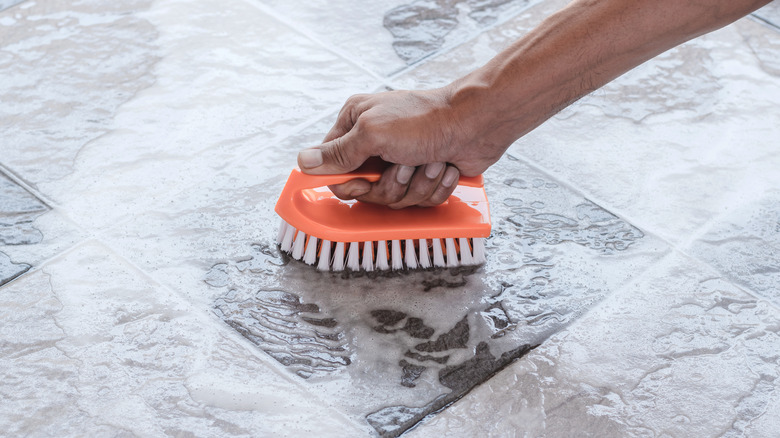Epsom Salt Is The Powerful Cleaning Ingredient That Gets Tile Floors Sparkling
Wholesome and simple Epsom salt has scores of uses. Soaking in a hot bath might first come to mind at the mention of this product, but its surprising list of uses may have you picking up bulk Epsom salts on your next trip to the grocery store. Also known as magnesium sulfate, you can use Epsom salts to keep your fern plants bright green and as a magnesium-booster in your lettuce garden. Epsom salt can even keep cockroaches away from your home. Beyond plant care and pest control, magnesium sulfate also has amazing strength for cleaning and deodorizing your home.
Let its antimicrobial power go to work on your dirty tile floors. You'll come away with a shining floor free of harsh products that cost a bundle and do untold damage to the planet. This method requires equal parts Epsom salt and Castile soap or liquid dish detergent plus a brush or mop with strong scrubbing capabilities. Give the tiles a robust scrub, focusing on the grout. Make sure to rinse away all extra cleaning mixture; if your floor has a drain or is outdoors (like on a patio or deck), spray or pour several buckets full of water on the surface until all the residue is gone. For most interior tile floors, use one or more clean mop heads and warm water to wash away the mixture.
How does Epsom salt clean so well?
If you've ever poured Epsom salt into a piping hot bath, you've noticed its large grains; these give it amazing abrasive qualities perfect for scrubbing away grime. More than just removing dirt and buildup, researchers have found that Epsom salts can fight off germs that cause pneumonia and staph infections. These criteria make magnesium sulfate an extra-smart addition to your bathroom cleaning routine.
Epsom salts are also said to be a tough opponent to heavy metals. Although there's not much vetted research available to back this up, some claim that magnesium sulfate is great at washing away heavy metals and other toxins on floors. After all, there is a healthy body of medical research supporting how Epsom salt can do this for humans. Since floors often hold onto some serious yuck that we bring in on our shoes, the thought of flushing it all away without adding more toxins is awfully satisfying. Having your tile floors come away with a dazzling shine is the icing on the cake.

